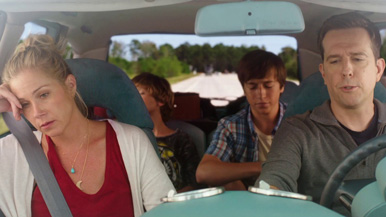Movie Review: Vacation
By Ben Gruchow
August 3, 2015
Consider the ubiquitous hot springs sequence from the ads. It’s vile and gross, but lethargic. There’s no sense that any of this amounts to more than actors utilizing props. Or witness the layover at Audrey Griswold’s house, with Leslie Mann and Chris Hemsworth forced to interminably extend tired punchlines; this sequence slaughters any momentum Vacation might have been building up to that point. If the movie can’t bring itself to exalt any energy over the proceedings, why should we?
Occasionally, a guest actor will venture onto the scene and bring it perilously close to life in the spirit of the original films: Regina Hall’s family friend nails the passive-aggressive tone of a hopeless social-media addict, and Charlie Day spearheads the only sequence in the movie that actually feels like it touches that dark vein of volatility from the first Vacation. Unfortunately, neither of these characters make an appearance beyond their single allotted sequence, and Day’s river-rafting sequence whiffs on its ending, with bland staging and some truly atrocious CGI work.
We spend more time with Chevy Chase and Beverly D’Angelo, in a sequence that is, I guess, meant to pass the torch from Clark to Rusty for any future Vacations. It’s been a long time since Chase has brought any manic energy to his screen work, and he doesn’t start now; instead, he’s here for a grotesque little cameo that exists solely to push the plot along to its final act and introduce a host of plot holes in whatever passed for the Vacation series’ universe (remember how, in the first Vacation, the Wagon Queen Family Truckster was a loaner, present only because Clark’s new car hadn’t arrived yet? This movie doesn’t). D’Angelo fares even worse; the actress has natural comic timing, and so the movie appropriately saddles her with somewhere between one and two lines of dialogue.
Clark and Ellen Griswold’s cameo also marks the absolute last moment in the movie that’s worth any kind of anything. From here, Vacation moves onto its final set piece and chain of events, and just describing what happens in that way gives the ending more significance and heft than it deserves. It’s not so much a climax and falling action as it is an exhausted petering-out, as if Daley and Goldstein had backed themselves into a corner and couldn’t think of any way to finish off their story than to put it through the most soporific, enervating conclusion available.
Ironically, a major player in the final scenes is Ron Livingston, playing a more esteemed rival pilot; he’s sharper, darker, and more charismatic than Helms, and he would have made an appropriate Rusty Griswold. He barely puts in an appearance, though, and our consolation prize is an ending that sucks all the air out of the auditorium and probably the one next door; it’s followed by end credits showing off some stunningly bad Photoshop work - the worst in a major motion picture in years, if ever. It’s an appropriately sour and mercenary note to end the film on.
Continued:
1
2
|
|
|
|




